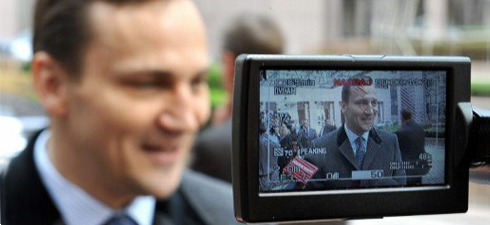In the wake of Radosław Sikorski’s 29 March adress to the lower house of parliament, you would be forgiven for thinking that Poland is in the process of becoming a mini-European superpower that is poised to take advantage of a stable political situation, a special partnership with Germany, a string of EU successes and its growing influence in the East.
Holding forth for an hour, the head of the diplomatic service strayed from the topic of self-promotion to bang on about the notion of national sovereignty and his vision for a federal Europe, in a speech replete with quotes from Valéry, Havel, Kołakowski, Hume, Jean-Paul II, Saint John, Wittgenstein and of course Sikorski himself.
There were, however, no references to Nicolas Sarkozy. The Polish Minister is not a fan of the French President, far from it. Nonetheless the two men do have a lot in common: they are both distinguished by their hyperactive zeal in launching multiple initiatives which deliver only very modest results.
Regrettable incidents
Both are professionals, but they are also unable to contain their impulsiveness: as a result their behaviour, which, on occasion, is characterised charming gallantry, can also be surprisingly vulgar. Both have shown a remarkable ability to describe ambitious political visions and a rather less laudable adroitness in appropriating credit for collective efforts, which they present as their own. Neither of them have any qualms about criticising others, while both are equally outraged by any criticism of themselves.
That is not to say that we can reproach Minister Sikorski for being inactive: not in the wake of his extensive overhaul of the Ministry of Foreign Affairs following the departure of Anna Fotyga [Foreign Affairs Minister in 2006 and 2007], and his modernisation of the foreign policy inherited from Bronisław Geremek [Foreign Affairs Minister from 1997 to 2000]. Sikorski is omnipresent, but the growth of Poland’s importance in the international arena, which is subject to external factors that cannot be controlled, is not commensurate with surging energy of our minister.
However, this observation is unlikely to undermine our minister’s unshakable faith in his abilities, especially when you consider that he clearly has trouble recognising his own limitations. In assessing the impact of his "Berlin speech," (a speech entitled “Poland and the future of the European Union" delivered on 28 November, 2011, in Berlin), Minister Sikorski modestly suggested that his intervention was responsible for Germany’s abandoning of its hard line on the role of the ECB in the bailout of the banks, and even weighed on the decision to appoint Joachim Gauck to the German presidency.
Like Sarkozy, Sikorski has had his moments of glory: there is no denying that his speech in Berlin did give an audible voice, which had been lacking, to the Polish Presidency of the EU. But such successes are also accompanied by regrettable incidents when the minister’s behaviour is more likely to leave Poles speechless: for example his recent "diplomatic intervention" at the Hotel Adlon in Berlin in response to the non-availability of Polish television in his room.
His propaganda could easily turn against him
When a government minister reaches for official note paper on such a flimsy pretext and afterwards boasts about it on Twitter, you can only wonder about his understanding of the meaning of diplomacy. But perhaps this is not the only misunderstanding.
In any case, the minister should leave it to others to sing the praises of his policies, and confine his remarks to the issue of their effectiveness in the coming months. As he has said himself with unaccustomed lucidity: "We need a pragmatic evaluation of our potential and our possible range of action."
All it would take is one unpleasant surprise for Poland, for example a sharp decline in the funds that we can count on in the next EU budget, and his propaganda about our future successes could easily turn against him. Let’s not forget that President Sarkozy, who was also extremely successful in presenting a very promising vision for the future, is now paying a high price for his failure to deliver.
Counterpoint
Poland, a new major European state
“We should pay attention” to Sikorski’s remarks to the Polish parliament, announcesLe Monde. The Parisian daily believes that the Foreign Minister’s speech —
… underscored the unprecedented development of Poland’s role in the EU, and presented a vision for Europe and its periphery which is sadly lacking in French politics, which tends to be marked by domestic navel gazing. Mr Sikorski is keen to distance the integration advocated by Warsaw from ‘utopian federalism’. There is no question of building a ‘bureaucratic superstate". Poland believes in merging the posts of the President of the European Commission and the President of the European Council, who should be elected by the European Parliament or universal suffrage.
Warsaw, remarks Le Monde, which has succeeded in engineering “a historically unprecedented rapprochement with Berlin”, is keen “to sing the praises of budgetary discipline” and “to adopt ambitious policies: to wit, its collaboration with Sweden to launch the Eastern Partnership to build ties with its former Soviet neighbours”. In short, Poland is a “new major European state”.
Was this article useful? If so we are delighted!
It is freely available because we believe that the right to free and independent information is essential for democracy. But this right is not guaranteed forever, and independence comes at a cost. We need your support in order to continue publishing independent, multilingual news for all Europeans.
Discover our subscription offers and their exclusive benefits and become a member of our community now!












